Conquering the Catfish in So Cal: Tales of a Newbie Nothing
#1
Follow this Catfish build thread if:
The Backstory:
It started when I was 2. My dad had a beat up 69 GT Velose Bertone design Alfa Romeo 1750. He used to take it to the local track down the road (Laguna Seca) and every once in a while I got to go watch! That's me in my red racing shoes (apparently holding a toothbrush)
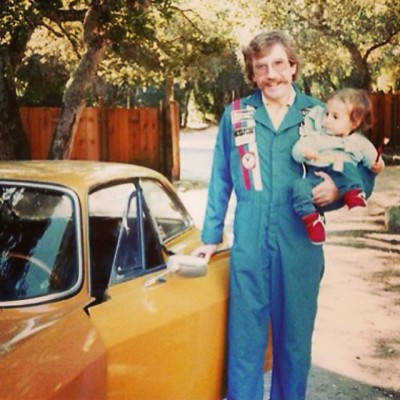
My passion grew, and as you might expect from any kid growing up in the 80’s I soon became the owner a sweet Dodge Viper GTS poster and a velcro Trapper Keeper with a picture of a lamborghini countach on it. I didn’t even mind playing dolls with my sister because it meant I got to play with her pink C4 Barbie corvette.
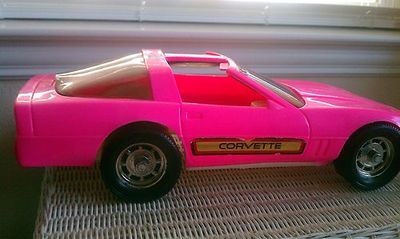
Fast forward to 2001 when I was able to save up enough cash to get my first “fun” car. I didn’t care if it was 10 years old with 122k miles on it, I was dead set on this 300zx Twin Turbo. Working my way through college I ended up getting a second job at JWT (a nissan performance shop) and quickly found myself in the back of the shop porting and polishing turbo housings, drilling and tapping fuel rails on the CNC, and grinding away at air intakes on the laithe. Every once in a while I would get to break up the monotony and hook a car up to the dyno or get a ride in the 500hp sentra. Fast forward another 14 years and I’ve since started a company, locked down a fiancee and surrounded myself with great friends here in San Diego (a number of which happen to have some pretty fun cars). I might be missing a few things but thats basically the important stuff.
The Decision:
About a year ago I started looking for a track car that would be somewhat easy to work on and relatively inexpensive to operate (as far as track cars go). At the same time I had always wanted to build a car so I decided I would start researching kit cars. My longtime childhood friend (Jay) agreed to help me with the build so I started looking at options. I came to the conclusion that a miata would be a great donor car and I was set on an Exocet. Before pulling the trigger I stumbled upon the Bauer Catfish and realized it was developed right here in my back yard (San Diego). Not only did I love the look but I loved that it was street legal, unique and purpose built to perform. After a few conversations with Cord Bauer and a test drive with Dave at Bent Motorsports I was sold.
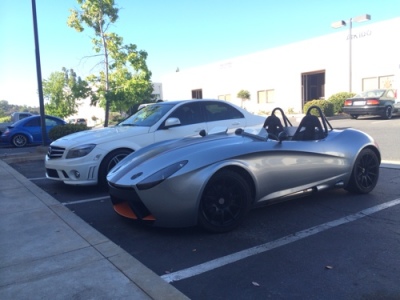
The Donor:
Deciding on a donor wasn’t easy. I had been told by multiple people that a newer NB (1999-2003) was the way to go. That said, I didn’t really want to spend $5k on a car I was about to rip apart. Cord introduced me to Roman up in LA (who is also involved with the Catfish) and he put together a complete donor package for me. The package was comprised of a 2003 VVT motor with 45k miles on it along everything else I needed. I also opted for a 6psd transmission and a 4.1 Torson LSD based on the fact that I planned to do a turbo at some point down the road.
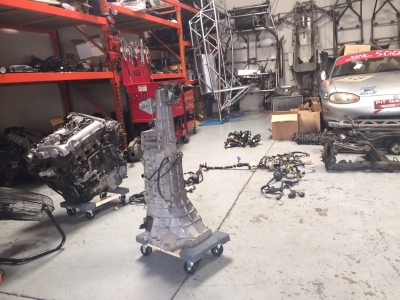
The Second Donor:
Well that “some point down the road” ended up being about 2 days after I picked up the donor pack. I was shopping around for the last couple things I needed on Craigslist and stumbled upon a NA track prepped car just a few miles away. The engine was in bad shape but it was a perfect situation because that was the one thing I didn’t want. I kept the wheels and the new R888 tires, the FM turbo kit with the Hydra Nemesis, the FM happy meal, the Ohlin adjustable suspension, the Willwood big brake kit, and a bunch of other performance items. I then parted out the huge list of extra stuff and all of a sudden my “stock” Catfish had just about every performance upgrade I had hoped to eventually get! A little luck, a lot of determination and a few sleepless nights have shaped up to be the beginnings of a pretty killer build.
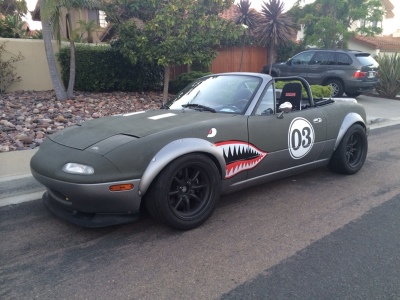
Next steps:
Prep for delivery
Build the roller skate
Finish selling unneeded parts
Learn everything there is to know about the Miata
Make some Miata friends
- You want to follow along as I attempt to build one of the first Bauer Catfish with a little help from my friends (AKA You).
- You have a high tolerance for “noobness”
- You want to feel good about being able to offer advice to someone who’s new to miatas and far from being ASE certified.
- You want to ride my emotional roller coaster of childhood dreams, self doubt, excitement, wavering regret, frustration and adrenaline.
The Backstory:
It started when I was 2. My dad had a beat up 69 GT Velose Bertone design Alfa Romeo 1750. He used to take it to the local track down the road (Laguna Seca) and every once in a while I got to go watch! That's me in my red racing shoes (apparently holding a toothbrush)

My passion grew, and as you might expect from any kid growing up in the 80’s I soon became the owner a sweet Dodge Viper GTS poster and a velcro Trapper Keeper with a picture of a lamborghini countach on it. I didn’t even mind playing dolls with my sister because it meant I got to play with her pink C4 Barbie corvette.

Fast forward to 2001 when I was able to save up enough cash to get my first “fun” car. I didn’t care if it was 10 years old with 122k miles on it, I was dead set on this 300zx Twin Turbo. Working my way through college I ended up getting a second job at JWT (a nissan performance shop) and quickly found myself in the back of the shop porting and polishing turbo housings, drilling and tapping fuel rails on the CNC, and grinding away at air intakes on the laithe. Every once in a while I would get to break up the monotony and hook a car up to the dyno or get a ride in the 500hp sentra. Fast forward another 14 years and I’ve since started a company, locked down a fiancee and surrounded myself with great friends here in San Diego (a number of which happen to have some pretty fun cars). I might be missing a few things but thats basically the important stuff.

The Decision:
About a year ago I started looking for a track car that would be somewhat easy to work on and relatively inexpensive to operate (as far as track cars go). At the same time I had always wanted to build a car so I decided I would start researching kit cars. My longtime childhood friend (Jay) agreed to help me with the build so I started looking at options. I came to the conclusion that a miata would be a great donor car and I was set on an Exocet. Before pulling the trigger I stumbled upon the Bauer Catfish and realized it was developed right here in my back yard (San Diego). Not only did I love the look but I loved that it was street legal, unique and purpose built to perform. After a few conversations with Cord Bauer and a test drive with Dave at Bent Motorsports I was sold.

The Donor:
Deciding on a donor wasn’t easy. I had been told by multiple people that a newer NB (1999-2003) was the way to go. That said, I didn’t really want to spend $5k on a car I was about to rip apart. Cord introduced me to Roman up in LA (who is also involved with the Catfish) and he put together a complete donor package for me. The package was comprised of a 2003 VVT motor with 45k miles on it along everything else I needed. I also opted for a 6psd transmission and a 4.1 Torson LSD based on the fact that I planned to do a turbo at some point down the road.

The Second Donor:
Well that “some point down the road” ended up being about 2 days after I picked up the donor pack. I was shopping around for the last couple things I needed on Craigslist and stumbled upon a NA track prepped car just a few miles away. The engine was in bad shape but it was a perfect situation because that was the one thing I didn’t want. I kept the wheels and the new R888 tires, the FM turbo kit with the Hydra Nemesis, the FM happy meal, the Ohlin adjustable suspension, the Willwood big brake kit, and a bunch of other performance items. I then parted out the huge list of extra stuff and all of a sudden my “stock” Catfish had just about every performance upgrade I had hoped to eventually get! A little luck, a lot of determination and a few sleepless nights have shaped up to be the beginnings of a pretty killer build.

Next steps:
Prep for delivery
Build the roller skate
Finish selling unneeded parts
Learn everything there is to know about the Miata
Make some Miata friends

Last edited by Built2Track; 10-28-2014 at 05:11 AM. Reason: fixed image links
#5
'99-'00 was a great flowing 1.8 with lower compression and everything you want EXCEPT VVT. You'll read about thrust bearing failures. If it hasn't happened yet, it's fine.
'01-'05 was a great flowing 1.8 with higher compression and VVT. More dangerous for boost with the high compression, but if you know what you're doing, it's technically better.
However it does still bring a premium selling price. Sell: buy MS.
#7
I still have the Hydra NIB with new 700cc injectors and the plug and play NB harness/adaptor from FM. I think I also have a Voodoo box from the NA donor. I'm open to selling both and getting something entirely different if there is a better option.
Regarding wheels, there is actually plenty of room for wide wheels under the fiberglass body of the catfish. I ended up selling the Rota RKR's in the picture from donor #2 and getting Avanti Storm S1 15x9's to use with the R888's. With the Avanti (which are +35 offset) I've been told I will need to run 25 or 35mm spacers in the back and 3mm to 10mm spacers in the front.
The measurement to watch with the wheels/tires is the diameter. The wheel openings are about 24.5" in diameter, so a 24" tire is pretty much the largest you could run.
Your friends are silly. Just to let you know:
'99-'00 was a great flowing 1.8 with lower compression and everything you want EXCEPT VVT. You'll read about thrust bearing failures. If it hasn't happened yet, it's fine.
'01-'05 was a great flowing 1.8 with higher compression and VVT. More dangerous for boost with the high compression, but if you know what you're doing, it's technically better.
However it does still bring a premium selling price. Sell: buy MS.
'99-'00 was a great flowing 1.8 with lower compression and everything you want EXCEPT VVT. You'll read about thrust bearing failures. If it hasn't happened yet, it's fine.
'01-'05 was a great flowing 1.8 with higher compression and VVT. More dangerous for boost with the high compression, but if you know what you're doing, it's technically better.
However it does still bring a premium selling price. Sell: buy MS.
#8
As far as I know, Hydra is pretty complicated to use. I also believe that you have to pay for updates. Megasquirt is the most common ECU around here. It's easy to set up, super easy to learn tuning on, and the amount of information here on it is incredible. Updates are free, and there's a lot of new firmware updates that add functionality from time time, despite already being very feature packed. It's also cheap, so you'd be able to build or buy one for cheaper than what you could sell your Hydra for. I doubt Hydra has any more features than MS3 anyway.
#9
The Hydra is a competent ECU. I recently switched from Hydra 2.5 to MS3, here's my impression of the tradeoffs:
- Hydra can drive low-impedance injectors w/o resistors, MS3 can't. This used to be a bigger deal than it is now that you can buy big high-impedance injectors that will still idle properly.
- Hydra 2.5 user interface is noticeably inferior to TS. It's slower, requires Windows XP, and requires an external and cranky USB-to-serial adapter. It lacks UI features for things like making large scale changes to maps. TS runs on Windows, Mac, Linux, it's much faster, and offers a much better UI.
- Hydra datalogging is at 12 Hz, MS3 is faster (I forget how fast). MS3 also datalogs a lot more variables, including internal variables for things like boost control, which makes tuning the PID algorithm a lot easier. I'm not super impressed with the log viewer UI, though.
- Hydra has a built-in wideband controller, MS3 needs an external one. This reduces wiring clutter, minimizes analog signal noise between the two, and lets the ECU know exactly when the WB is warmed up. OTOH replacement Hydra sensors are a lot more expensive than an LC1 sensor. You can address the analog signal noise issue with the RS232-to-CAN box that Reverent sells, at an additional cost. This was a big deal for me, because the LC-2 wideband I bought lacks a dedicated signal ground, and the square wave of the heater circuit power introduced significant noise error into the analog wideband O2 signal.
- Reverant's MS3 does an awesome job of controlling the NB alternator, far far better than the Hydra ever did.
- MS3 does a big pile of stuff Hydra 2.5 does not (timing-based idle control, E85, water injection, the list goes on and on).
- Hydra is a lot more expensive, like 2-3 times as much. Software updates also cost money, and usually only deliver new features, not fixes to the stuff in the old box that's broken. Updating my 2.5 box to 2.7 was over a grand, which is about the same as I spent buying the MS3 and ID1000s outright. OTOH, buying it from FM means you can call up Jeremy and ask him for tuning support. It's up to you if that's more valuable than free tuning advice on mt.net. Free is free, but sometimes it's only worth what you paid for it.
I'm told Hydra 2.7 addresses many of the "Hydra 2.5 doesn't do X" complaints, and also has a completely reworked UI. I haven't run it, so I can't comment on it.
The single biggest factor for me is that I can download the source code to the MS3 and read it. It's not open source, so I can't distribute any changes I make to it, but ECUs are notoriously badly documented and it's infinitely better to be able to read the source code when I'm trying to figure out WTF a particular feature does.
--Ian
- Hydra can drive low-impedance injectors w/o resistors, MS3 can't. This used to be a bigger deal than it is now that you can buy big high-impedance injectors that will still idle properly.
- Hydra 2.5 user interface is noticeably inferior to TS. It's slower, requires Windows XP, and requires an external and cranky USB-to-serial adapter. It lacks UI features for things like making large scale changes to maps. TS runs on Windows, Mac, Linux, it's much faster, and offers a much better UI.
- Hydra datalogging is at 12 Hz, MS3 is faster (I forget how fast). MS3 also datalogs a lot more variables, including internal variables for things like boost control, which makes tuning the PID algorithm a lot easier. I'm not super impressed with the log viewer UI, though.
- Hydra has a built-in wideband controller, MS3 needs an external one. This reduces wiring clutter, minimizes analog signal noise between the two, and lets the ECU know exactly when the WB is warmed up. OTOH replacement Hydra sensors are a lot more expensive than an LC1 sensor. You can address the analog signal noise issue with the RS232-to-CAN box that Reverent sells, at an additional cost. This was a big deal for me, because the LC-2 wideband I bought lacks a dedicated signal ground, and the square wave of the heater circuit power introduced significant noise error into the analog wideband O2 signal.
- Reverant's MS3 does an awesome job of controlling the NB alternator, far far better than the Hydra ever did.
- MS3 does a big pile of stuff Hydra 2.5 does not (timing-based idle control, E85, water injection, the list goes on and on).
- Hydra is a lot more expensive, like 2-3 times as much. Software updates also cost money, and usually only deliver new features, not fixes to the stuff in the old box that's broken. Updating my 2.5 box to 2.7 was over a grand, which is about the same as I spent buying the MS3 and ID1000s outright. OTOH, buying it from FM means you can call up Jeremy and ask him for tuning support. It's up to you if that's more valuable than free tuning advice on mt.net. Free is free, but sometimes it's only worth what you paid for it.

I'm told Hydra 2.7 addresses many of the "Hydra 2.5 doesn't do X" complaints, and also has a completely reworked UI. I haven't run it, so I can't comment on it.
The single biggest factor for me is that I can download the source code to the MS3 and read it. It's not open source, so I can't distribute any changes I make to it, but ECUs are notoriously badly documented and it's infinitely better to be able to read the source code when I'm trying to figure out WTF a particular feature does.
--Ian
#14
Joined: Sep 2010
Posts: 7,996
Total Cats: 1,027
From: Lake Forest, CA
If you have someone to do the tuning for you who is a Hydra wizard, and you're willing to keep throwing money at it (to buy the Hydra, to update the Hydra, and to pay your tuner) then buy the Hydra. It is a very powerful and capable ECU.
HOWEVER... If you'd like to tune yourself and don't want to be reliant on a tuner like a piglet sucking its mother's teat, sell your Hydra stuff and buy a MS.
One of my winter projects this year: sell my AEM EMS4 and go MS. Deciding between MSLabs MS3 or DIYAutotune MSPNP Pro.
HOWEVER... If you'd like to tune yourself and don't want to be reliant on a tuner like a piglet sucking its mother's teat, sell your Hydra stuff and buy a MS.
One of my winter projects this year: sell my AEM EMS4 and go MS. Deciding between MSLabs MS3 or DIYAutotune MSPNP Pro.

#15
Considering I did get the Hydra for a steal (basically free with the second donor car) and considering that I won't likely be doing the tuning myself I think I'll probably stick with it for now. Either way I've probably got a month or two to decide.
#16
Prepping for Delivery and building the roller skate:
After putting down the deposit I spent the last few weeks parting out the second donor and prepping for the arrival of the kit. We swapped the (almost new) FM happy meal that was in the NA 5psd and installed it on the NB 6psd then assembled the full roller skate connecting the front and rear subframe via the PPF.
I figure I'll hold onto the 5spd so I have an extra tranny considering that they don’t appear to be worth more than about $300. I’ve also heard from a few people that I may like the 5spd better. Before assembling the roller skate I thoroughly cleaned everything including the front and rear subframe. I also replaced the motor mounts and the rear main seal for good measure.
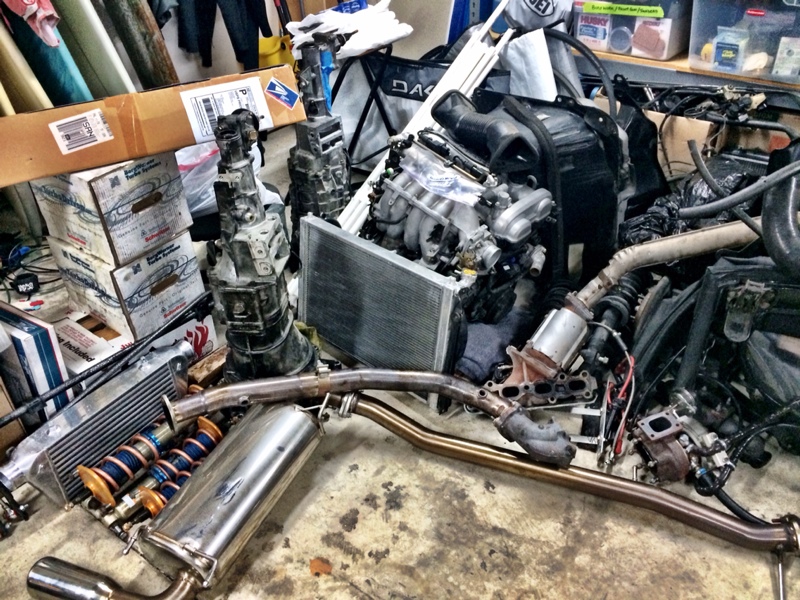
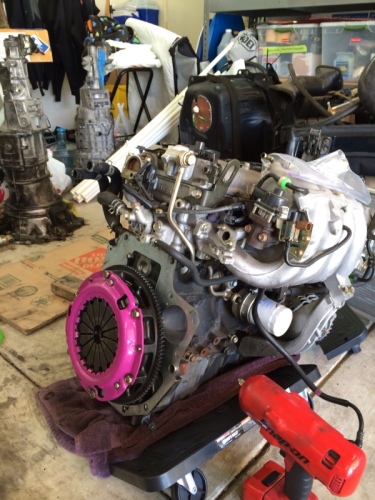
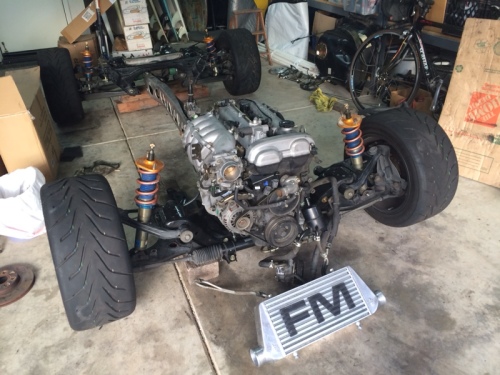
Delivery:
About 30-40 sleepless nights after putting down the deposit Cord delivered the frame and body. Jay, Cord and I were easily able to carry the frame off the trailer (which I believe weighs about 225 lbs). We were able to drop it right on the roller skate and I instantly had a rolling chassis. The fiberglass body is also insanely light and I can easily carry one entire side of the car with one hand. Guessing all 5 parts of the fiberglass body weighs less than 100 lbs total!
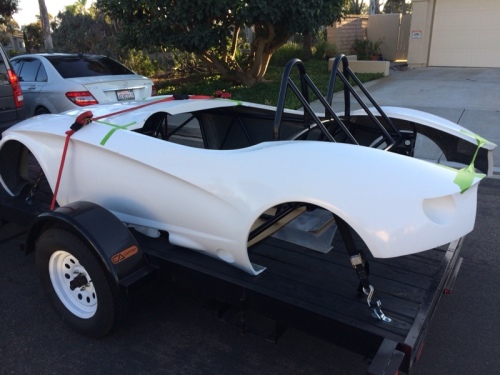
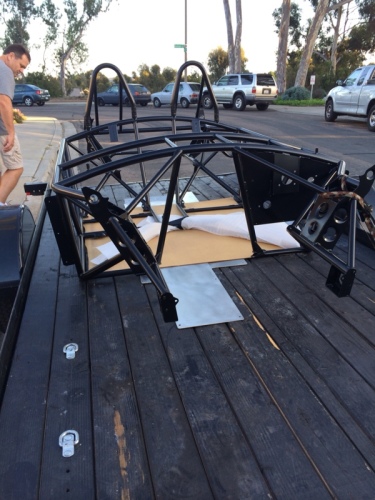
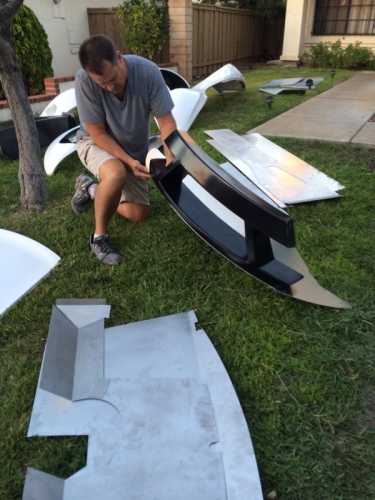
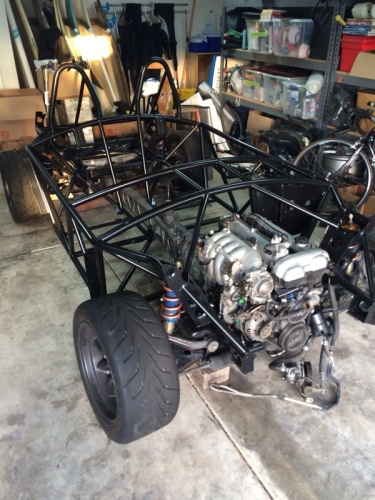
After putting down the deposit I spent the last few weeks parting out the second donor and prepping for the arrival of the kit. We swapped the (almost new) FM happy meal that was in the NA 5psd and installed it on the NB 6psd then assembled the full roller skate connecting the front and rear subframe via the PPF.
I figure I'll hold onto the 5spd so I have an extra tranny considering that they don’t appear to be worth more than about $300. I’ve also heard from a few people that I may like the 5spd better. Before assembling the roller skate I thoroughly cleaned everything including the front and rear subframe. I also replaced the motor mounts and the rear main seal for good measure.



Delivery:
About 30-40 sleepless nights after putting down the deposit Cord delivered the frame and body. Jay, Cord and I were easily able to carry the frame off the trailer (which I believe weighs about 225 lbs). We were able to drop it right on the roller skate and I instantly had a rolling chassis. The fiberglass body is also insanely light and I can easily carry one entire side of the car with one hand. Guessing all 5 parts of the fiberglass body weighs less than 100 lbs total!




Last edited by Built2Track; 10-31-2014 at 04:20 AM. Reason: still figuring out how to embed images haha
#19
We were able to drop it right on the roller skate and I instantly had a rolling chassis.
 Talk about selling the product to your customer!
Talk about selling the product to your customer!Anybody under 250ish ft/lbs should be running a 5 spd, above that and it's unfortunate that the easiest "upgraded" transmission is the 6 spd.
And if a 5 spd is worth $300, we're all millionaires. Around my area they're $100, and you're crazy if you think you'll get $150 for one.














